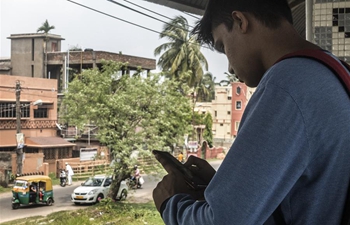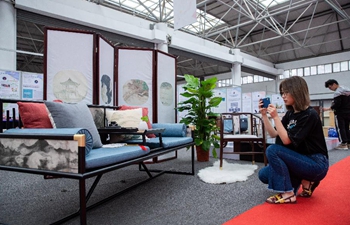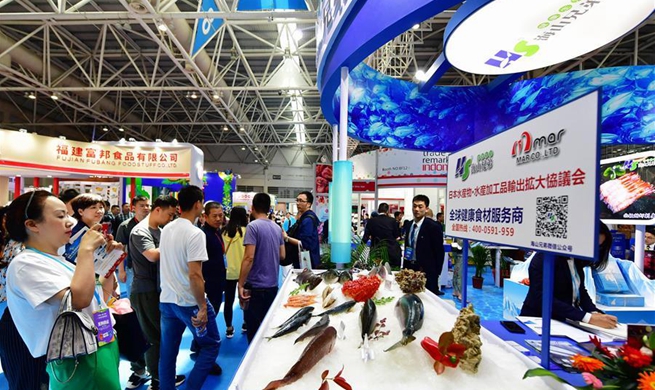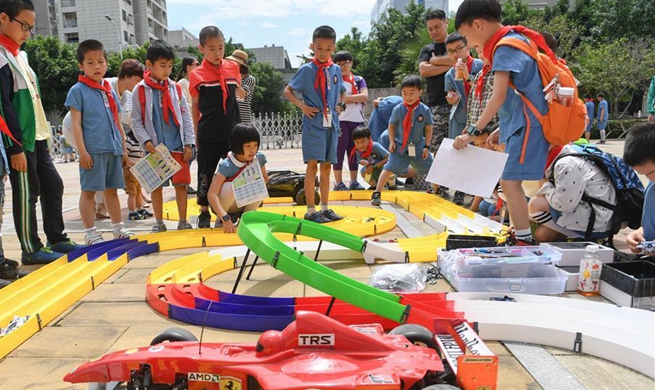TOKYO, May 31 (Xinhua) -- Upper house members from both Japan's ruling and opposition parties on Friday said more constant efforts are needed to eradicate hate speech here, with some members calling for a new law to be enacted to ban the discriminatory practice.
Owing to rising instances of xenophobic remarks made against residents in Japan of foreign lineage and their descendants, particularly, but not limited to Korean residents in Japan known as "Zainichi Koreans," an anti-hate speech law was brought into effect in 2016.
Four upper house members who were instrumental in the legislation passing, however, pointed out Friday that the current law has its limitations.
"There is a limit with the current law to tackle human rights violations on the Internet," Yoshifu Arita, from the main opposition Constitutional Democratic Party of Japan, told reporters Friday.
A government website last year, for instance, was widely condemned for allowing public posts to be displayed carrying xenophobic remarks about Korean residents in Japan.
The Cabinet Office website, at the time, asked the Japanese public to post their opinions about some political issues, and among the posts, some read "Kick out the Koreans" and "Their forcible deportation is necessary."
The Cabinet Office at the time stopped receiving and posting the public's comments but did not remove or filter any of the comments prior to that, with an official saying that the opinions of the public should be respected.
But as the government has tried to clamp down on instances of hate speech, it has, more recently, been further embroiled in controversy.
"An increasing number of local governments have established ordinances and guidelines in line with the law, but some candidates have made hate speeches during their election campaigns," ruling Liberal Democratic Party (LDP) member Shoji Nishida said.
"The public needs to understand this kind of behavior is not socially acceptable," Nishida said on Friday.
In terms of court rulings, Katsuo Yakura, a member of the LDP's coalition partner Komeito, said that to some extent the law has had some effect, noting that injunctions have been issued to ban hate speech, but maintained that, "We need to make constant efforts."
Such xenophobic ideology here has, for decades, been the source of a great deal of intimidation and suffering for Korean and other non-Japanese residents in Japan, particularly owing to a notorious "citizens' group" called Zainichi Tokken wo Yurusanai Shimin no Kai, the official name of the ultra-nationalist group better known as Zaitokukai.
The group, described by Japan's National Police Agency as a potential threat to public order due to its "extreme nationalist and xenophobic" ideology, in their public demonstrations, are typically dressed in Imperial Japanese Army-inspired uniforms and use megaphones while waving imperial flags.
Zaitokukai, often likened to neo-Nazis, believe that some Korean residents in Japan, known as "Zainichi Koreans," are being given special legal privileges by the government here to help integrate them into the Japanese society.
Zaitokukai also vocally oppose long-term Korean residents who have been given permanent residence status by the Ministry of Justice and, as such, are eligible to claim the same welfare benefits as Japanese citizens.
Zaitokukai's xenophobic manifesto, calls for Zainichi Koreans, as well as other non-Japanese residing here, to be stripped of their legal citizenship, kicked out of Japan, belittled in public, harassed on the streets and in their places of business, and, in the most extreme and shocking cases, assaulted, raped and murdered.
In terms of Japanese law, there is a clear distinction between a "hate crime" and a "hate speech," but groups like Zaitokukai have previously exploited the law and operated in a grey area under so-called free-speech.
As such, thousands of people's lives of all ages here have been made miserable, including young children of foreign ancestry, as hate crimes could be punishable by law, but individuals and groups who made hate speeches could do so with complete impunity.
Hence, Japanese Communist Party member, Sohei Nihi, said Friday that the only way to eradicate such hate speech was to enact a new law to ban it.
Japan is home to around 600,000 ethnic Koreans, many of whom are the descendants of the nearly 800,000 Korean workers who were forcibly brought here to work during Japan's brutal colonial occupation of the Korean Peninsular during World War II.
The anti-hate speech law, while being a step in the right direction towards eradicating hate speech, is not being applied with unequivocal conviction through local governments nationwide, experts on the matter said, and the law is lacking in comprehensive punitive measures.
Other critics of the law noted that despite the victims of hate speech have suffered for decades and Japan has been a signatory to the United Nations International Convention on the Elimination of All Forms of Racial Discrimination since the mid-1990s, the law was only brought into effect in 2016.













